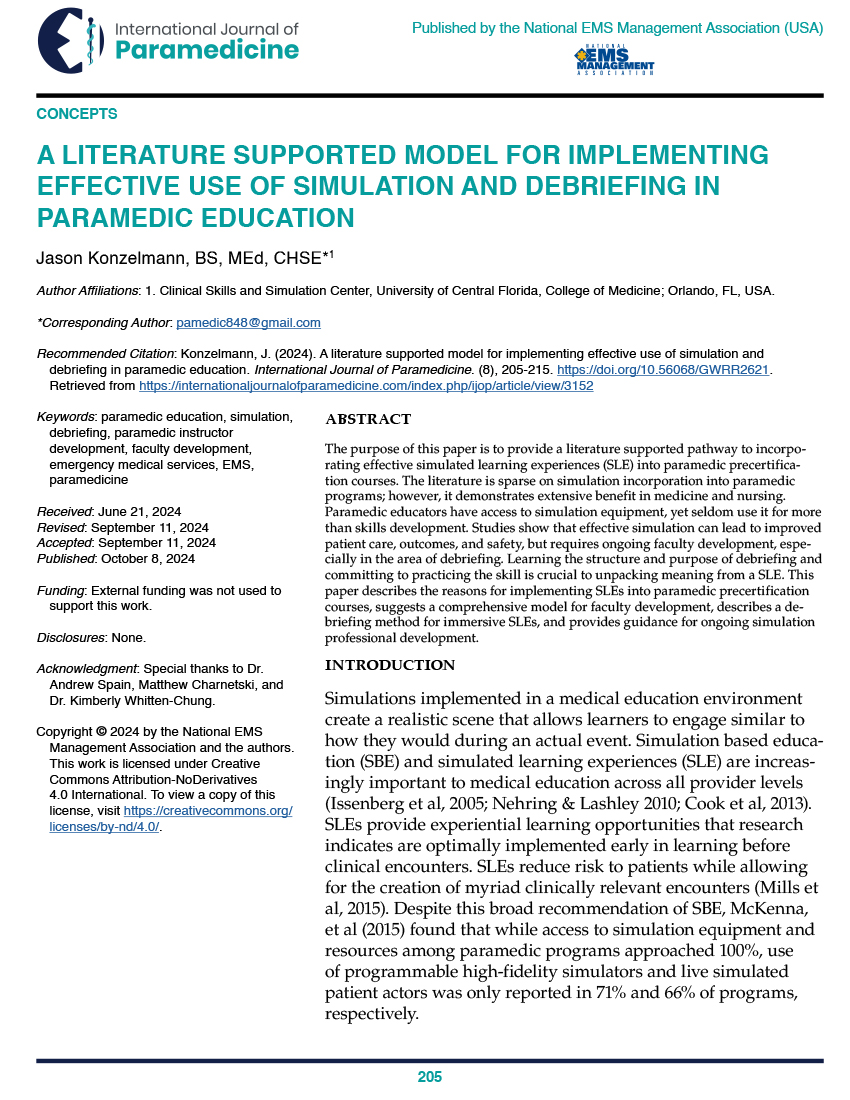A Literature Supported Model for Implementing Effective Use of Simulation and Debriefing in Paramedic Education
Main Article Content
Abstract
The purpose of this paper is to provide a literature supported pathway to incorporating effective simulated learning experiences (SLE) into paramedic precertification courses. The literature is sparse on simulation incorporation into paramedic programs; however, it demonstrates extensive benefit in medicine and nursing. Paramedic educators have access to simulation equipment, yet seldom use it for more than skills development. Studies show that effective simulation can lead to improved patient care, outcomes, and safety, but requires ongoing faculty development, especially in the area debriefing. Learning the structure and purpose of debriefing and committing to practicing the skill is crucial to unpacking meaning from a SLE. This paper describes the reasons for implementing SLEs into paramedic precertification courses, suggests a comprehensive model for faculty development, describes a debriefing method for immersive SLEs, and provides guidance for ongoing simulation professional development.
Article Details

This work is licensed under a Creative Commons Attribution-NoDerivatives 4.0 International License.
Publishing in IJOP allows authors to keep their copyright while giving IJOP unrestricted copyright permissions. Articles published in IJOP use Creative Common Attribution 4.0 International (CC BY-ND 4.0) licensing. This license requires that re-users give credit to the creator. It allows re-users to copy and distribute the material in any medium or format in unadapted form only, even for commercial purposes. Additional terms apply and can be accessed here.
Publishing in IJOP also allows authors to have contracts for non-exclusive distribution of the Journal's published version of the article, such as posting to an institutional repository or publication in a book, on the condition that the original publication in the original layout format in IJOP is retained and acknowledged.
We permit and encourage authors to post the articles they published in IJOP on their affiliated websites. This helps share the information, encourages citation in other works, and promotes scholarly discourse in the spirit of open access.
References
Beal, M.D., Kinnear, J., Anderson, C.R., Martin, T.D., Wamboldt, R., & Hooper, L. (2017). The effectiveness of medical simulation in teaching medical students critical care medicine: A systematic review and meta-analysis. Simulation in Healthcare, 12(2), 104-116. doi: https://doi.org/10.1097/SIH.0000000000000189
Boyle, M., Williams, B. & Burgess, S. (2007). Contemporary simulation education for undergraduate paramedic students. Emergency Medicine Journal, 24, 854-857. DOI: https://doi.org/10.1136/emj.2007.046318
Centra, J. A. (1978). Types of faculty development programs. Journal of Higher Education, 49, 151-162. DOI: https://doi.org/10.2307/1979280
Cheng, A., Eppich, W., Kolbe, M., Meguerdichian, M., Bajaj, K., & Grant, V. (2019). A conceptual framework for the development of debriefing skills: A journey of discovery, growth, and maturity. Simulation in Healthcare, 15(1), 55-60. DOI: https://doi.org/10.1097/SIH.0000000000000398
Cheng, A., Grant, V., Dieckmann, P., Arora, S., Robinson, T., & Eppich, W. (2015). Faculty development for simulation programs: Five issues for the future of debriefing training. Simulation in Healthcare, 10(4), 217-222. DOI: https://doi.org/10.1097/SIH.0000000000000090
Cheng, A., Morse, K. J., Rudolph, J. W., Arab, A.A., Runnacles, J., & Eppich, W. (2016) Learner centered debriefing for health care simulation education: Lessons for faculty development. Simulation in Healthcare, (11)1, 32-40. DOI: https://doi.org/10.1097/SIH.0000000000000136
Cook, D. A., Hamstra, S. J., Brydges, R., Zendejas, B., Szostek, J.H., Wang, A. T., Erwin, P.J., & Hatala, R. (2013). Comparative effectiveness of instructional design features in simulation-based education: Systematic review and meta-analysis. Medical Teacher, 35(1), 867-898. DOI: https://doi.org/10.3109/0142159X.2012.714886
Eppich, W. & Cheng, A. (2015). Promoting excellence and reflective learning in simulation (PEARLS): Development and rationale for a blended approach to health care simulation debriefing. Simulation in Healthcare, 10(2), 106-115. DOI: https://doi.org/10.1097/SIH.0000000000000072.
Issenberg, B. S., McGaghie, W. C., Petrusa, E. R., Lee Gordon, D., & Scalese, R. J. (2005). Features and uses of high-fidelity medical simulations that lead to effective learning: A BEME systematic review. Medical Teacher, 27(1), 10-28. DOI: https://doi.org/10.1080/01421590500046924.
Jeffries, P. R. Getting in S.T.E.P with simulations: Simulations take educator preparation. (2008). Nursing Education Perspectives, 29(2), 70-73. DOI: https://doi.org/10.1097/00024776-200803000-00006.
McKenna, K. D., Carhart, E., Bercher, D., Spain, A., Todoro, J., & Freel, J. (2015). Simulation use in paramedic education research (SUPER): A descriptive study. Prehospital Emergency Care, 19(3), 423-440. DOI: https://doi.org/10.3109/10903127.2014.995845
Meyer, M. N., Connors, H., Qingjiang, H., Gajewski, B. (2011). The effect of simulation on clinical performance: A junior nursing student clinical comparison study. Simulation in Healthcare, 6(5), 269-277. DOI: https://doi.org/10.1097/SIH.0b013e318223a048.
Mills, B. W., Carter, O. B. J., Rudd, C. J., Ross, N. P., & Claxton, L. A. (2015). Clinical placement before or after simulated learning environments? A naturalistic study of clinical skills acquisition among early-stage paramedicine students. Simulation in Healthcare, 10(5), 263-269. DOI: https://doi.org/10.1097/SIH.0000000000000107
Nehring, W. M. & Lashley, F. R. (2010). Nursing simulation: A review of the last 40 years. Simulation & Gaming, 40(4), 528-552. DOI: https://doi.org/10.1177/1046878109332282.
Palaganas, J. C., Epps, C., & Raemer, D. B. (2014). A history of simulation-enhanced interprofessional education. Journal of Interprofessional Care, 28(2), 110-115. DOI: https://doi.org/10.3109/13561820.2013.869198
Peterson, D. T., Watts, P. I., Epps, C. A., & White, M. L. (2017). Simulation faculty development: A tiered approach. Simulation in Healthcare, 12(4), 254-259. DOI: https://doi.org/10.1097/SIH.0000000000000225
Rudolph, J. W., Raemer, D. B., & Simon, R. (2014) Establishing a safe container for learning in simulation: The role of presimulation briefing. Simulation in Healthcare, (9)6, 339-349. DOI: https://doi.org/10.1097/SIH.0000000000000047
Rudolph, J. W., Simon, R., Dufresne, R. L. & Raemer, D. B. (2006). There’s no such thing as “nonjudgmental” debriefing: A theory and method for debriefing with good judgment. Simulation in Healthcare, 1(1), 49-55. DOI: https://doi.org/1559-2332/06/0101-0049
Zigmont, J., Oocumma, N., Szyld, D., & Maestre, J.M. (2014). Educator training and simulation methodology courses. In: Palaganas, J.C., Maxworthy, J. M., Epps, C. A., & Mancini, M. E. (Eds.), Defining Excellence in Simulation Programs. Wolter Kluwer/Lippincott Williams & Wilkins.

